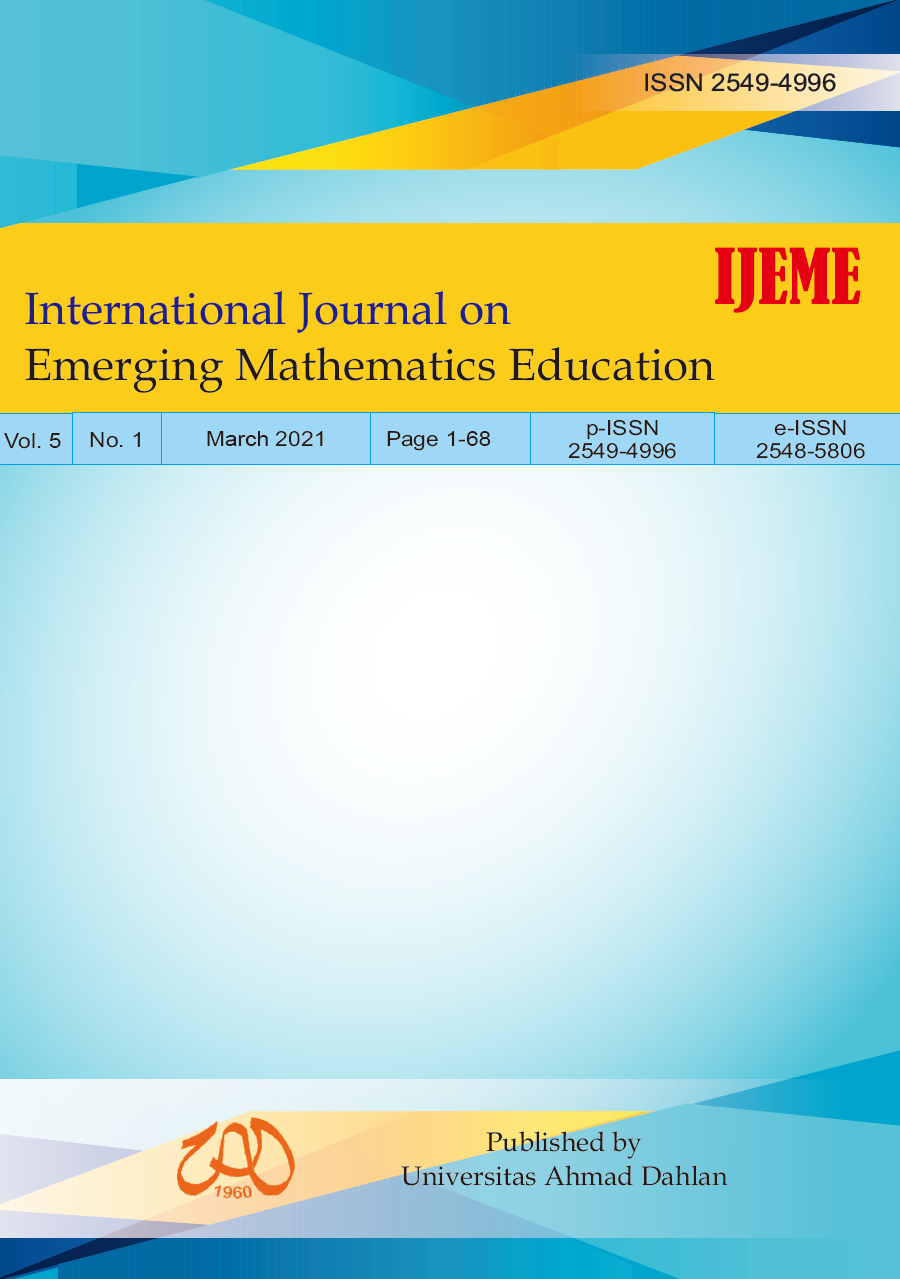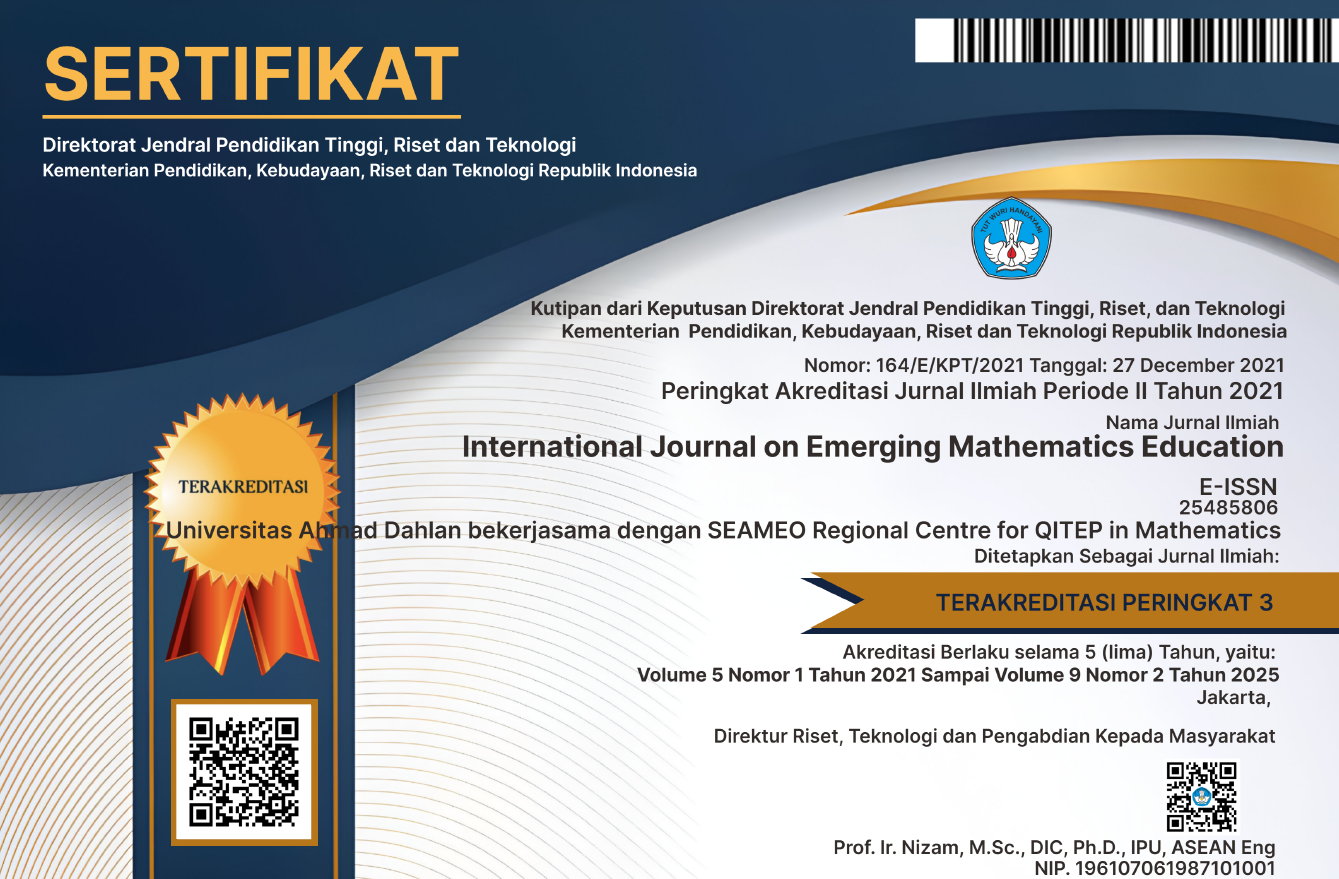Pedagogical Content Knowledge (PCK) Mathematics Pre-service Teachers in Developing Content Representations (CoRes)
DOI:
https://doi.org/10.12928/ijeme.v5i1.19954Keywords:
CoRes, learning, PCK, pre-service teacherAbstract
This study aimed to determine the pedagogical content knowledge (PCK) of pre-service teachers in developing CoRes as a support for designing mathematics learning. Data were collected by reviewing documents of CoRes development results by 32 pre-service teachers after analyzing school mathematics learning documents in the form of syllabi and lesson plans prepared by experienced teachers. The analysis of the results of the pre-service CoRes document made by the pre-service teachers is done using descriptive statistics that are by calculating the mean. The results of the data analysis show that 18.8% of the pre-service teachers achieved very good qualification, 56.3% with good qualification, 15.6% with sufficient qualification, and 9.4% with poor qualification. Although there were still pre-service teachers belonged to the poor qualification, there were no pre-service teachers who failed in developing CoRes. Some individual students still seem to have difficulty developing CoRes. However, the CoRes document that has been prepared is very useful for carrying out further activities. Thus, it can be concluded that the development of CoRes can be used by pre-service teachers as a support to design learning.
References
Arends, R. I. (2012). Learning to teach. Mc Graw Hill Companies.
Ball, D. L., Thames, M. H., & Phelps, G. (2008). Content knowledge for teaching: What makes it special. Journal of teacher education, 59(5), 389-407.
den Heuvel-Panhuizen, V., Blum, W., Artigue, M., Mariotti, M. A., & Sträßer, R. (2019). European traditions in didactics of mathematics.
Carr, D. (2004). Moral values and the arts in environmental education: Towards an ethics of aesthetic appreciation. Journal of philosophy of education, 38(2), 221-239.
Davis, E. A., & Krajcik, J. S. (2005). Designing educative curriculum materials to promote teacher learning. Educational researcher, 34(3), 3-14.
De Jong, O., & Van Driel, J. (2004). Exploring the development of student teachers' PCK of the multiple meanings of chemistry topics. International Journal of Science and Mathematics Education, 2(4), 477-491.
Franke, M. L., & Kazemi, E. (2001). Learning to teach mathematics: Developing a focus on students' mathematical thinking. Theory Into Practice, 40(2), 102-109.
Hammon, L. D, et al. (2010). Preparing Principals for a Changing World. Jossey-Bass.
Hiebert, J., Morris, A. K., Berk, D., & Jansen, A. (2007). Preparing teachers to learn from teaching. Journal of Teacher Education, 58(1), 47-61.
Hume, A., & Berry, A. (2011). Constructing CoRes-a Strategy for Building PCK in Pre-service Science Teacher Education. Research in Science Education, 41(3), 341-355.
Killen, R. (2009). Effective teaching strategies (5th ed.). C &C Offset Printing.
Loughran, J., Mulhall, P., & Berry, A. (2004). In Search of Pedagogical Content Knowledge in Science: Developing Ways of Articulating and Documenting Professional Practice. Journal of Research in Science Teaching, 41(4), 370-391.
Loughran, J., Mulhall, P., & Berry, A. (2008). Exploring pedagogical content knowledge in science teacher education. International Journal of Science Education, 30(10), 1301-1320.
Marsigit, M. (2016). Pembelajaran matematika dalam perspektif kekinian. Math Didactic: Jurnal Pendidikan Matematika, 2(3), 132-141.
Mergler, A. G., & Spooner-Lane, R. (2012). What pre-service teachers need to know to be effective at values-based education. Australian Journal of Teacher Education, 37(8), 66-81.
Mishra, P., & Koehler, M. J. (2006). Technological Pedagogical Content Knowledge: A Framework for Integrating Technology in Teacher Knowledge. Teachers College Record, 108(6), 1017-1054.
Moore, K. D. (2016). Effective instructional strategies: From theory to practice. Journal of Indian Education, 42(1), 140-153.
Morris, A. K., Hiebert, J., & Spitzer, S. M. (2009). Mathematical for Knowledge Teaching in Planning and Evaluating Instruction: What Can Preservice Teachers Learn? Journal for Research in Mathematics, 40(5), 491-529.
Mulhall, P., Berry, A., & Loughran, J. (2003). Frameworks for representing science teachers pedagogical content knowledge. Asia Pacific on Science Learning and Teaching, 4(2), 1-25.
NCTM. (2000). Principle and Standards for School Mathematics (Vol. 1). The national Council of Teachers of Mathematics.
Nilsson, P. (2008). Teaching for understanding: The complex nature of pedagogical content knowledge in pre-service education. International Journal of Science Education, 30(10), 1281-1299.
Peker, M. (2009). The use of expanded microteaching for reducing pre-service teachers' teaching anxiety about mathematics. Scientific Research and Essays, 4(9), 872-880.
Retnawati, H. (2015). Hambatan Guru Matematika Sekolah Menengah Pertama Dalam Menerapkan Kurikulum Baru. Jurnal Cakrawala Pendidikan, 3(3), 390-403.
Retnawati, H., Kartowagiran, B., Hadi, S., & Hidayati, K. (2011). Identifiction of Student's Learning Difficulties on Mathematics and Science At Elementary School. Jurnal Kependidikan, 41(2), 162-174.
Rollnick, M., Bennett, J., Rhemtula, M., Dharsey, N., & Ndlovu, T. (2008). The place of subject matter knowledge in pedagogical content knowledge: A case study of South African teachers teaching the amount of substance and chemical equilibrium. International Journal of Science Education, 30(10), 1365-1387.
Schunk, D. H. (2012). Learning theories an educational perspective (6th ed.). Pearson education Inc.
Shulman, L. S. (1987). Knowledge and teaching: foundations of the new reform. Havard Educational Review, 57(1), 1-22.
Slavin, E., Produk, S., & Produk, D. (2012). Cooperative learning. Nusa Media.
Subanji. (2016). Peningkatan Pedagogical Content Knowledge Guru Matematika Dan Praktiknya Dalam Pembelajaran Melalui Model Pelatihan Teqip. Jurnal Ilmu Pendidikan, 21(1), 71-79.
Turnuklu, E., & Yesildere, S. (2007). The Pedagogical Content Knowledge in Mathematics: Pre-Service Primary Mathematics Teachers' Perspectives in Turkey. Issues in the Undergraduate Mathematics Preparation of School Teachers, 1, 1-13.
Downloads
Published
How to Cite
Issue
Section
License
License and Copyright Agreement
In submitting the manuscript to the journal, the authors certify that:
- They are authorized by their co-authors to enter into these arrangements.
- The work described has not been formally published before, except in the form of an abstract or as part of a published lecture, review, thesis, or overlay journal. Please also carefully read the International Journal on Emerging Mathematics Education (IJEME) Author Guidelines at http://journal.uad.ac.id/index.php/IJEME/about/submissions#authorGuidelines
- That it is not under consideration for publication elsewhere,
- That its publication has been approved by all the author(s) and by the responsible authorities, tacitly or explicitly, of the institutes where the work has been carried out.
- They secure the right to reproduce any material that has already been published or copyrighted elsewhere.
- They agree to the following license and copyright agreement.
Copyright
Authors who publish with the International Journal on Emerging Mathematics Education (IJEME) agree to the following terms:
- Authors retain copyright and grant the journal the right of first publication with the work simultaneously licensed under a Creative Commons Attribution License (CC BY-SA 4.0) that allows others to share the work with an acknowledgment of the work's authorship and initial publication in this journal.
- Authors are able to enter into separate, additional contractual arrangements for the non-exclusive distribution of the journal's published version of the work (e.g., post it to an institutional repository or publish it in a book), with an acknowledgment of its initial publication in this journal.
- Authors are permitted and encouraged to post their work online (e.g., in institutional repositories or on their website) prior to and during the submission process, as it can lead to productive exchanges, as well as earlier and greater citation of published work.
![]()
Ciptaan disebarluaskan di bawah Lisensi Creative Commons Atribusi-BerbagiSerupa 4.0 Internasional.





